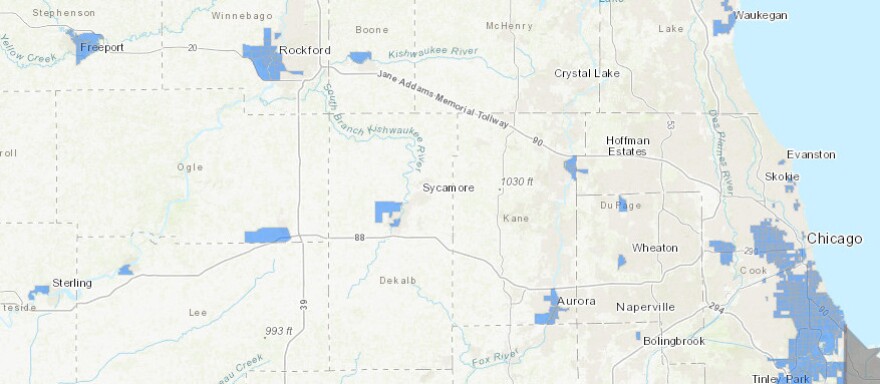Recreational marijuana becomes legal in Illinois January 1, 2020. According to lawmakers, some communities have been disproportionately affected by the criminalization of cannabis. The new law tries to help those people, should they be interested in getting into the legal cannabis industry.

A number of lawmakers said the criminalization of cannabis has had a negative effect on employment, housing, health, and business ownership for certain residents, including some in northern Illinois. That's why the legalization of recreational use includes a social equity program.
Those who qualify for the program may be eligible for technical assistance and support in creating a business plan, reduced license and application fees, and access to low-interest loans.
Michael Negron is the Assistant Director of the Illinois Department of Commerce and Economic Opportunity.
“If you yourself were affected by it, or someone in your immediate family," Negron said, "that's one way in."
Another is if someone lived in one of the affected areas and spent significant time in there.
"And since we want to create jobs and we want to encourage economic development in these communities," Negron said, "another way in is if you're hiring individuals who have lived in these area.”
The agency created a map to show areas throughout the state they consider to be disproportionately affected.

The department took into account census data for the frequency of arrests, poverty, and incarceration rates. Negron said the program won't be perfect, but it’s a start in repairing the social and financial harm of criminalization.
“Different people will look at this and say, 'We should have done this or should have done that,'" he said, "but the legislation was an attempt to address what many people across the political spectrum have identified as a really negative effect from the way the war on drugs has been prosecuted over the last generation.”
What do residents think?
Steve Rodriguez lives in one of the neighborhoods included in the map. On a recent fall day, he was hanging Halloween decorations in front of his home in DeKalb’s Omega Circle neighborhood. The homes are neatly aligned, and neighborhood watch signs are plastered on many windows. He said he supports medical cannabis, but has reservations about recreational use.
“THC is one of the issues that a lot of doctors bring up that affect the mind, especially of young people," Rodriquez said. "And it causes issues down the road -- and this is the doctor saying this not me -- and I'm going by that. So I support medical marijuana 100% -- but not the recreational use of it.”
He’s not familiar with the social equity program and said he feels other areas in DeKalb were impacted by cannabis related laws and enforcement more than his.
"I don't think that this neighborhood in particular has been necessarily harmed," Rodriguez said. "I do know that areas up through Greek Row -- those apartment areas there, they’ve had an effect by illegal drugs, which is marijuana obviously. That brings, you know, social costs, it brings criminal costs."
He’s talking about the area near the campus of Northern Illinois University -- where resident turnover is much higher. Nicole Fisher is one of his neighbors. She said she doesn’t think her street has been disproportionately affected either.
"I think this neighborhood, at least, is just neutral," Fisher said. "I don't think that any harm has come from it and I don't think any harm will come from it.”
Meanwhile, in Rockford, the map includes the downtown core and a large portion of the city’s west side. Part of the map includes the surrounding streets near Collins Park. This part looks like an island, standing alone like a small dot.

George lives here. He declined to give his last name. He said this area is full of an aging population and long time homeowners. He and his neighbors will have easier access to claim a part of the growing cannabis business. But he said he’s got a strong opinion against recreational cannabis and he "absolutely" will not seek to cash in on job benefits available to him under the social equity program.
"I don't begrudge anyone who chooses to use it," George said. "Don't come near me. I don't want anything to do with you. I’m extremely adamant against it."
He said he sees a decline in businesses in the area, but not a historically high crime rate. He said it makes sense that his general area of the city is on the map, just not his street.
"It does to me because in knowing everybody between here and Riverside and here and Main, there are a lot of lower income people," he said. "Unfortunately, they're just not on this street."
Map could change
Michael Negron with the Department of Commerce and Economic Opportunity said the social equity map could evolve as the industry grows in Illinois.
“The underserved area criteria is refreshed with regularity," Negron said. "Poverty rates, unemployment rates-- things like that. So you know, I could anticipate updating the map in a year or two based on new underserved area data.”
In just over a month, Illinois residents 21 and over will be able to possess and purchase up to 30 grams of cannabis flower from licensed dispensaries. The state is still deciding where dispensaries will be located. Officials say the long-term impact of the social equity program remains to be seen.


